Key Takeaways | Voices from the Field | Acknowledgements | Recordings | Connecting Further | Resources
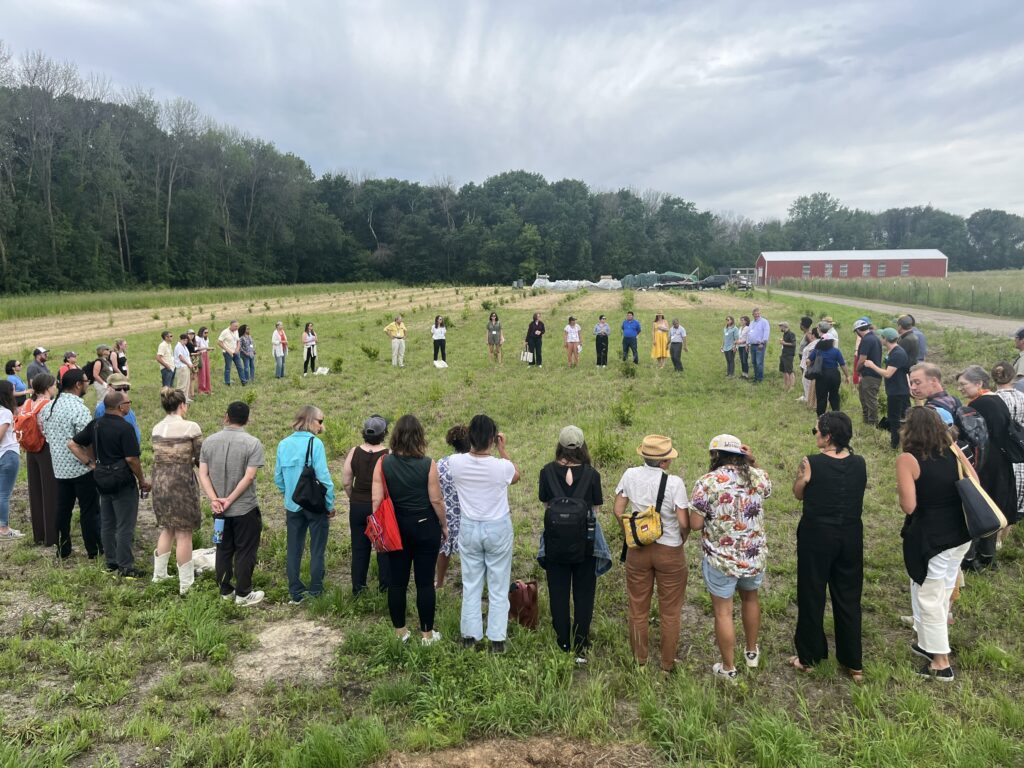
Last month, as part of our SAFSF On The Road series, we gathered over 80 climate, energy, and agriculture funders, and community leaders in Minneapolis for “Building an Intersectional Philanthropic Approach: Climate Change, Agriculture, and Healthy Rural Communities.” This event underscored the urgent need for investing in rural communities and agriculture as essential strategies for climate mitigation and resilience. It highlighted the importance of implementing comprehensive, systemic interventions to address the challenges effectively. These investments are crucial for promoting sustainable agriculture and enhancing the resilience of rural areas to climate impacts.
Over the two days, we:
- Explored the science behind agriculture’s impact on climate,
- Learned about the effects of climate change on various communities,
- Uplifted community-led solutions for diverse rural communities,
- Discussed the need for market development and policy changes to support climate-resilient agriculture.
The event was hosted on the unceded territory of the Dakota people, which was also settled by Anishinaabe and Ho-Chunk relatives, near Ȟaȟa Wakpá, the mighty Mississippi River. Remarkably, we gathered in the Mill City Museum in the historic mill district where a century ago industrial-scale food production dominated the Midwestern landscape. These historical echoes remind of the enduring presence and resilience of the Dakota people and their ongoing contributions to this land, as well as the legacy of our work today for future generations. As we reflect on history, we recognize the generational obligation at this moment. Now is the time for a major shift toward climate-wise agriculture based on ecological principles, Indigenous land stewardship, and equitable outcomes for rural communities.
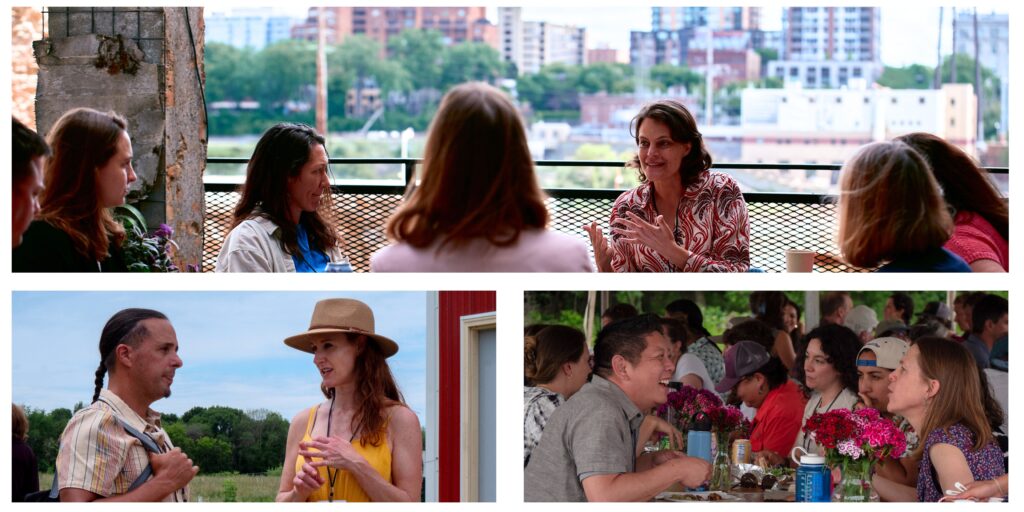
Experience key moments from this through our online photo gallery. If you have additional photos from this event please email them to maggie@safsf.org.
Here are five key takeaways that funders working in climate and agriculture need to know:





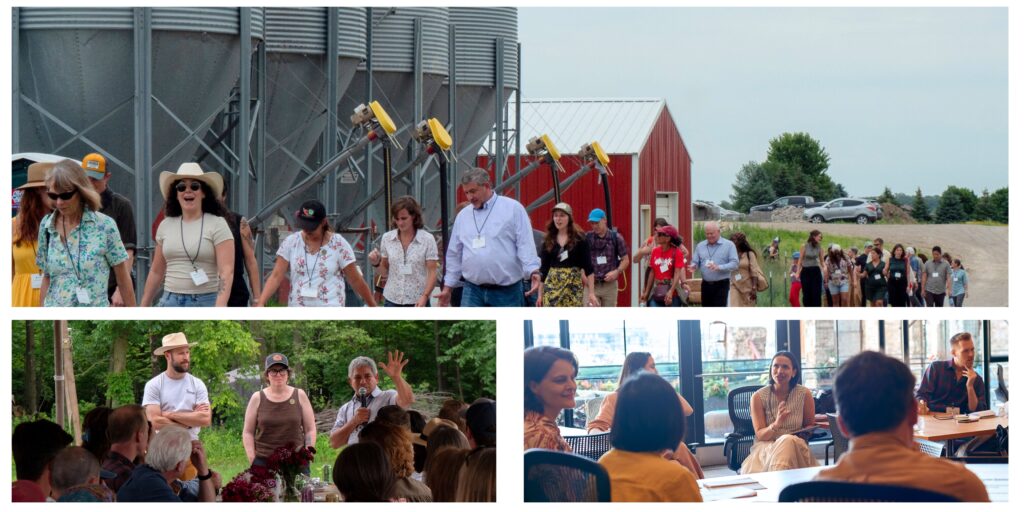
Voices on Climate, Agriculture, and Healthy Rural Communities
To see our full agenda and speaker bios, click here.
A farmer’s perspective on what to invest in.

What makes the Midwest a unique place for carbon capture?

How do we transition to more diversified climate-resilient farming?

How do we sustain a climate transition in agriculture?
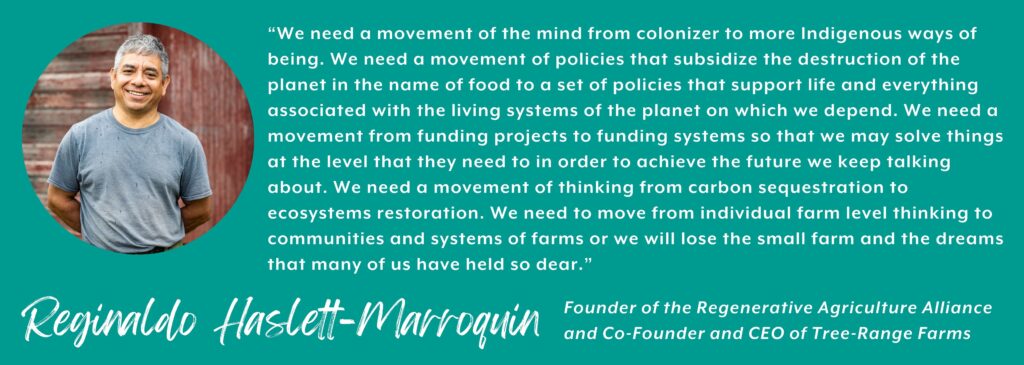
Why is it important to work with Tribal Nations?

Audio Recordings & Presentation Materials
SAFSF members will have unlimited access to these materials through the Member Portal. Please respect the work of these experts and do not share without attribution, credit, or context. Additional learning materials can be found below. Event attendees received access to these materials via email.
Acknowledgments & Gratitude
Land acknowledgments are only as good as their direction toward action and reparations. In this spirit, SAFSF donated 5% of registration costs to the Dakota-led non-profit Owámniyomni Okhódayapi: The Falls Initiative to support their inspiring work transforming 5-acres of land adjacent to Owámniyomni also known as “St. Anthony Falls” into a place of healing, restoration, education, and connection. The Falls Initiative uplifts Dakota voices and tells the stories that have been silenced for generations. We encourage participants (and everyone reading this) to consider complimenting our donation as a part of your participation and presence in our gathering.
This event was produced in partnership with Funders for Regenerative Agriculture, Health and Environmental Funders Network, and Climate and Energy Funders Group. We are deeply appreciative to the Regenerative Agriculture Foundation and McKnight Foundation for their sponsorship and thought partnership, to NATIFS and the Indigenous Food Lab for sharing resources and gifts with attendees, and to Mill City Museum and D’Amico Catering for a seamless event experience.

Connecting Further: Membership & Events
Want to keep the conversation going? Join HEFN and SAFSF in Durham, North Carolina on October 27 for a day of site visits and speakers examining the connections between agriculture and environmental justice, with a focus on CAFOs’ impact on communities and climate. This is an all-day program with limited attendance and a pre-event for HEFN’s Annual Meeting taking place October 28-30, Beyond November: Philanthropy’s Role in a Thriving Health and Environmental Justice Movement. If you are interested in participating, please fill out this form.

Sustainable Agriculture and Food Systems Funders (SAFSF) is a national membership organization for philanthropy and impact investors committed to creating an equitable and sustainable food and agriculture system. Through dynamic in person and virtual programming, SAFSF offers funders cutting-edge insights and transformational learning on food and agriculture systems, leading to more strategic investments and powerful collaborations. With over 100 members, we are welcoming new funders to join, with application deadlines on July 30 and October 15. Join today! Contact Holly Enowski at holly@safsf.org for an application or to schedule an informational call.
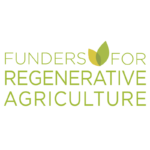
Funders for Regenerative Agriculture (FORA) launched in early 2020 and is an affinity group of funders who are learning, acting, and investing together to accelerate the transition of our agricultural systems to a more regenerative, just, and nutritious system for all people and our ecosystems. We believe that regeneration must be about restoring, honoring, and nurturing the cultural, social and ecological context unique to each piece of land and each community. With dynamic programming in the field, working groups, and opportunities for collective action, we welcome new members to join. Contact FORA staff at staff@forainitiative.org for membership information, to schedule an informational call, or to learn about upcoming events.

The Health and Environmental Funders Network (HEFN) is a philanthropy-supporting organization that brings funders together to connect, collaborate, and learn about environmental health and justice issues and how they can take collective action to make a greater impact in their giving. It’s the only funders network focused exclusively on environmental health and justice and their intersection with other critical issues facing frontline communities today. HEFN welcomes membership applications from foundations, donors, consultants, advisers, and wealth managers interested in environmental health and justice philanthropy. Members share a commitment to the network’s mission and values. Interested in joining or want to learn more? Please visit hefn.org/membership


Resources
Featured Speaker Organizations
- American Farmland Trust
- CalCAN
- ClimateWorks Foundation
- Food System 6
- GRACE Communications Foundation
- Minnesota Farmers’ Market Association
- North American Traditional Indigenous Food Systems (NATIFS)
- Owámniyomni Okhódayapi
- Pesticide Action Network
- Purdue University Department of Horticulture and Landscape Architecture
- University of Minnesota Forever Green Initiative
- University of Illinois Gardner Agriculture Policy Program
- University of Illinois School of Integrative Biology
- University of Illinois Institute for Sustainability, Energy, and Environment
- Regenerative Agriculture Alliance
- Rural Climate Partnership
- Salvatierra Farms
- Tree Range Farms
Reports and Articles
- The Overlooked Climate Impact of Rural America—Rural Climate Partnership
- Regenerative Capital: Aligning Intention with Reality—Reginaldo Haslett-Marroquin
- “Grow Your Green” Farm Profitability Cohort 2024——highlighting Sina War’s work
- Scaling Agroecology from the Bottom-up: Six Domains of Transformation by Colin R. Anderson, Janneke Bruil, M. Jahi Chappell, Csilla Kiss and Michel P. Pimbert
Books
- Between Soil and Society: Legislative History and Political Development of Farm Bill Conservation Policy by Jonathan Coppess
- The Fault Lines of Farm Policy: A Legislative and Political History of the Farm Bill by Jonathan Coppess
- In The Shadow of The Green Man by Reginaldo Haslett-Marroquin
- A Call to Farms: Some Thoughts on Food, Money and Nonviolence In Honor of Wendell Berry by Woody Tasch
- Agroecology Now! Transformations Towards More Just and Sustainable Food Systems by Colin Ray Anderson, Janneke Bruil, M. Jahi Chappell, Csilla Kiss, and Michel Patrick Pimbert